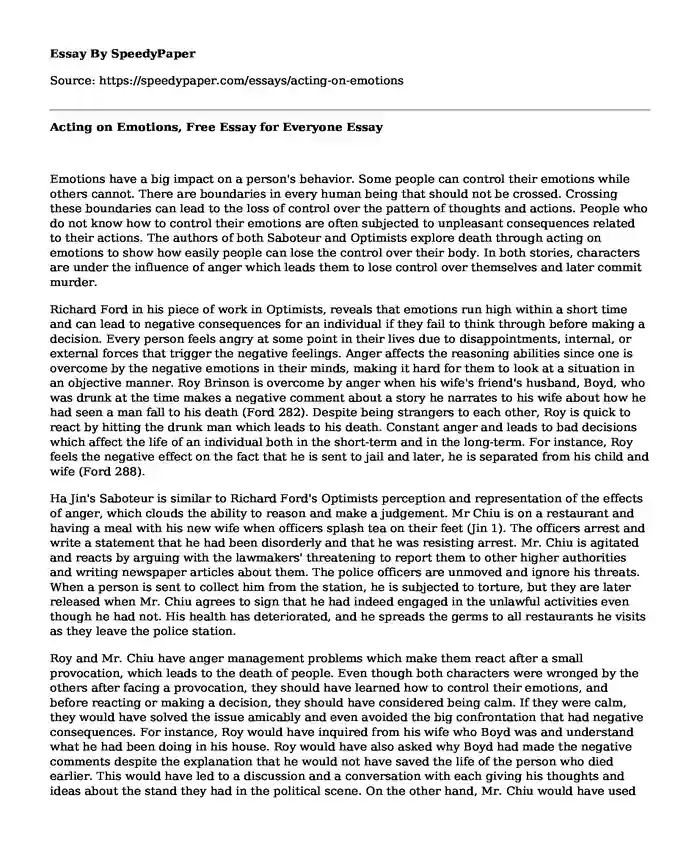
| Type of paper: | Essay |
| Categories: | Psychology Human behavior |
| Pages: | 3 |
| Wordcount: | 734 words |
Emotions have a big impact on a person's behavior. Some people can control their emotions while others cannot. There are boundaries in every human being that should not be crossed. Crossing these boundaries can lead to the loss of control over the pattern of thoughts and actions. People who do not know how to control their emotions are often subjected to unpleasant consequences related to their actions. The authors of both Saboteur and Optimists explore death through acting on emotions to show how easily people can lose the control over their body. In both stories, characters are under the influence of anger which leads them to lose control over themselves and later commit murder.
Richard Ford in his piece of work in Optimists, reveals that emotions run high within a short time and can lead to negative consequences for an individual if they fail to think through before making a decision. Every person feels angry at some point in their lives due to disappointments, internal, or external forces that trigger the negative feelings. Anger affects the reasoning abilities since one is overcome by the negative emotions in their minds, making it hard for them to look at a situation in an objective manner. Roy Brinson is overcome by anger when his wife's friend's husband, Boyd, who was drunk at the time makes a negative comment about a story he narrates to his wife about how he had seen a man fall to his death (Ford 282). Despite being strangers to each other, Roy is quick to react by hitting the drunk man which leads to his death. Constant anger and leads to bad decisions which affect the life of an individual both in the short-term and in the long-term. For instance, Roy feels the negative effect on the fact that he is sent to jail and later, he is separated from his child and wife (Ford 288).
Ha Jin's Saboteur is similar to Richard Ford's Optimists perception and representation of the effects of anger, which clouds the ability to reason and make a judgement. Mr Chiu is on a restaurant and having a meal with his new wife when officers splash tea on their feet (Jin 1). The officers arrest and write a statement that he had been disorderly and that he was resisting arrest. Mr. Chiu is agitated and reacts by arguing with the lawmakers' threatening to report them to other higher authorities and writing newspaper articles about them. The police officers are unmoved and ignore his threats. When a person is sent to collect him from the station, he is subjected to torture, but they are later released when Mr. Chiu agrees to sign that he had indeed engaged in the unlawful activities even though he had not. His health has deteriorated, and he spreads the germs to all restaurants he visits as they leave the police station.
Roy and Mr. Chiu have anger management problems which make them react after a small provocation, which leads to the death of people. Even though both characters were wronged by the others after facing a provocation, they should have learned how to control their emotions, and before reacting or making a decision, they should have considered being calm. If they were calm, they would have solved the issue amicably and even avoided the big confrontation that had negative consequences. For instance, Roy would have inquired from his wife who Boyd was and understand what he had been doing in his house. Roy would have also asked why Boyd had made the negative comments despite the explanation that he would not have saved the life of the person who died earlier. This would have led to a discussion and a conversation with each giving his thoughts and ideas about the stand they had in the political scene. On the other hand, Mr. Chiu would have used his academic knowledge to understand that police officers may sometimes act brutally despite the law that exists on the land, prohibiting them from engaging in unlawful detention acts. This would have made him accept the arrest and signed that he was wrong in the first instance.
Works Cited
Ford, Richard. "Optimists." The Art of the Story: An International Anthology of Contemporary Short Stories, edited by Daniel Halpern, Penguin Books, 2000, pp. 279-290.
Jin, Ha. "Saboteur." An Introduction to Fiction, edited by X.J. Kennedy Dana Gioia, Longman Publishers New York, 2006, pp.1-8.
Cite this page
Acting on Emotions, Free Essay for Everyone. (2022, May 20). Retrieved from https://speedypaper.com/essays/acting-on-emotions
Request Removal
If you are the original author of this essay and no longer wish to have it published on the SpeedyPaper website, please click below to request its removal:
- Krudas Cubensi - Free Essay Containing Songs Analysis
- Free Essay Example in HRM: Hiring Mistakes
- Free Essay Example on Cotton History
- Essay Example: Frankenstein Critical Analysis Evaluation
- Essay Sample: Compassion in Undermining Political Suffering and Politically Achieved Rights
- Essay Sample on America's Fake News on Political or Social Issue
- Paper Example. Training, Development, and Compensation
Popular categories




